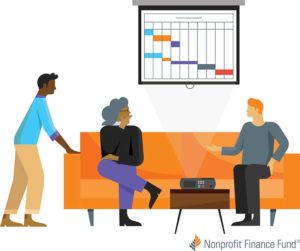 Written by: Trella R. Walker, JD
Written by: Trella R. Walker, JD
Associate Director for Advisory Services
Nonprofit Finance Fund (NFF)
AABLI alumna, Class #9
It is no secret that nonprofit organizations have expenses that go beyond those associated with programming. We often label those expenses as overhead or indirect costs. Just as necessary to nonprofits as direct programming costs, these expenses include executive salaries, administrative supplies, facility costs, technology and other items. Such costs, however, are difficult to fund.
So what is the answer? Simply put: nonprofits need profits. They need the ability to cover both direct and indirect costs in order to provide critical services to their communities. In addition, social sector organizations must be able to prepare for opportunities such as changing/implementing new programs, and challenges such as contingencies for lost or delayed funding.
In order to strategically prepare for opportunities and challenges, nonprofits should identify the full costs needed to operate, including:
- Expenses – funds to cover all expenses, both indirect and direct (overhead/program)
- Working capital – cash to meet liquidity needs such as punctual bill payments
- Reserves – board designated fund(s) to serve a particular purpose
- Debt principal repayment – funds to pay down debt
- Fixed asset additions – funds to purchase new equipment, furniture, or other forms of capital
- Change capital – funds to reposition the organization’s business model.
All nonprofits should have the first three. Determination of the last three is based on the organization and its circumstances.
Makes sense, right? Yet many organizations, particularly those led by people of color, struggle just to cover expenses. The entire nonprofit sector needs to shift so that organizations can adapt to a landscape in which the funding is continuously changing. Nonprofit executives should advocate for contracts and grants that cover their full costs, and funders should move past practices that merely cover program expenses instead of supporting organizations in a more comprehensive way.
Both nonprofit board members and foundation/corporate trustees/board members have roles to play in this sector shift. Here’s how board members/trustees can help:
- Advocate for full cost needs
Boards are often the biggest advocates for budgeting to zero instead of a surplus! In 2017, only 29% of organizations budgeted to a surplus nationally (Nonprofit Finance Fund’s 2018 State of the Sector Survey). Budgeting to a surplus requires an adjustment in thinking; nonprofits need profits in order to operate with working capital to support cash flow needs, or to build reserves for designated purposes. Budgeting to zero may allow an organization to cover its annual expenses, but it does not allow the organization to prepare for exciting opportunities and inevitable challenges.
Nonprofit leaders must determine their full cost needs in order to make this change. If this is a new practice, gradual goal setting with the support of the board can help the organization move away from budgeting to zero and begin to focus on full cost needs. Board members can and should pay specific attention to building the funds needed for the organization beyond its expenses.
- Look beyond programming
Expanding the focus beyond programming is just as important. If the only measure of success for an organization is how much its programming grows or expands, this will prohibit the organization from preparing for its future. Providing funding and support to organizations that continue to do good work without growing or changing can help the organizations prepare for the future.
- Raise/Give unrestricted dollars
Finally, board members, trustees and donors can help by giving unrestricted dollars/general operating support that can be used to fund organizations’ full cost needs. By supplying organizations with funding that is not limited, organizations can build stronger foundations and prepare for challenges.
As board members and trustees, our fiduciary responsibility makes identifying and securing our organizations’ full costs a necessity. Together, we can make stronger nonprofit organizations and thus strengthen our communities.
For more information and further research on understanding full costs, please visit fullcostproject.org. For more information about the State of the Nonprofit Sector, please visit Nonprofit Finance Fund’s survey page at https://nff.org/learn/survey.
Trella R. Walker, JD, AABLI Class #10, is the Associate Director for Advisory Services with Nonprofit Finance Fund (NFF). She provides nonprofits with data-driven analysis that frames NFF’s consulting guidance in a comprehensive and clear manner. Specific bodies of work include team promotion of the full cost work through the Philanthropy California project, leading national initiatives that help provide support and access to dynamic arts organizations through partnerships with organizations like the International Association of Blacks in Dance MOVE initiative and the National Performance Network LANE initiative, and supporting continued messaging regarding the learnings garnered from these bodies of work through workshops and writings in the field. Prior to joining NFF, Walker worked in nonprofits across a variety of fields including arts and entertainment, youth, education, healthcare, veteran affairs, and law. She holds a Bachelor of Arts in English and Secondary Education as well as a Juris Doctor degree.






